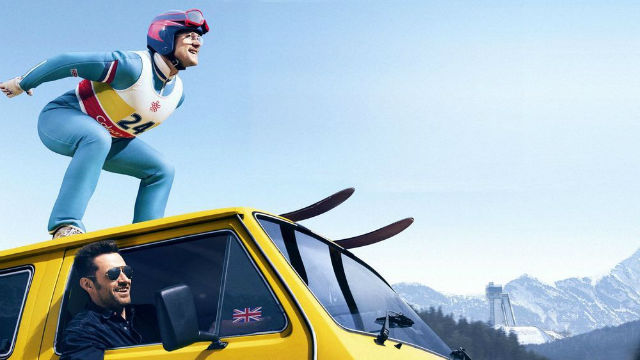Movie Review: Eddie the Eagle (2016)
“Win or lose, always aim high”


Eddie the Eagle (2016)
Director: Dexter Fletcher
Cast: Taron Egerton, Hugh Jackman, Tom Costello
Synopsis: The story of Eddie Edwards, the notoriously tenacious British underdog ski jumper who charmed the world at the 1988 Winter Olympics.
The only thing we Brits love more than an underdog is an heroic failure, and few underdogs can have failed as heroically in the field of sports as British ski jumper Eddie ‘The Eagle’ Edwards. As a bespectacled 24-year-old at the 1988 Calgary Winter Olympics, Edwards stole the headlines from his fellow Olympians by somehow smashing the British records for 70m and 90m ski jumps while simultaneously coming last (by some impressive margin) in both events. Needless to say, when it comes to snow sports, we Brits are about as useful as a Jamaican bobsleigh team…
To emphasise the real Edwards’ naturally geeky appearance, handsome young British actor Taron Egerton (Kingsman: The Secret Service, Legend), thrusts out his chin and repeatedly pushes the oversized spectacles through which he peers owlishly at his fellow cast members up his nose. He’s a likeable young actor, and he gives a winning performance, aided immeasurably by the fact that Sean Macaulay and Simon Kelton’s script performs cartwheels to get us on Edwards’ side. Apart from his doting mum (Jo Hartley – When the Lights Went Out), everyone in Eddie’s life seems to go out of their way to discourage him from following his dream. His old man (Keith Allen – 24 Hour Party People, Agent Cody Banks 2: Destination London) looks upon his son’s efforts with a combination of weary resignation and open disdain and encourages Eddie to follow in his steps as a plasterer; having already ejected him from the ski-ing squad, the British Olympics Committee, led by the snobbish and condescending Dustin Target (Tim McInnerny – 101 Dalmatians, 102 Dalmatians), actively discourages Edwards from pursuing his dream, by increasing the length of the jump he must make in order to qualify; other, more proficient jumpers, ridicule him, and, after he makes it to Calgary against all the odds, his team-mates deliberately get him drunk so that he misses the opening ceremony. Even Bronson Peary (Hugh Jackman – The Prestige, Prisoners), the washed-up, semi-alcoholic groundsman at the site of Edwards’ practice inrun in Germany who eventually becomes his coach, considers the enthusiastic young man to be a suicidal lunatic.
Peary was once himself a promising ski-jumper, but failed to take the sport seriously enough for his own inspirational coach’s liking (Christopher Walken – Things to Do in Denver When You’re Dead) and has been drinking heavily since his career fell apart. Needless to say, he’s a totally fictional character drafted in to add a little glamour, but then most of the movie is complete fantasy. Rather than receiving training from a washed-up alcoholic in Germany, Edwards was learning his trade in Lake Placid from two men (presumably the change of location was the result of budgetary limitations after shelling out A-list wages for a Hollywood star). So you could say that, apart from the fact that it has Edwards receiving training in a place he never visited from a person who never existed, Eddie the Eagle sticks rigidly to the truth.
But, despite this cavalier attitude when it comes to the facts, Eddie the Eagle is a funny, hugely entertaining feel-good movie which finds, in Eddie Edwards, a genuinely endearing underdog. Eddie’s unwavering belief in the face of ridicule for everyone he meets delivers a positive message, and the film somehow succeeds in making coming last a source of inspiration. There are many who complain that Eddie the Eagle is a celebration of failure, the story of a mediocre athlete who deprived a real sportsman from competing at the Olympics. But these people completely fail to understand meaning of both the film and the Games. Pierre de Coubertin, the founder of the modern Olympic Games, decreed that the most important thing in the Games is not winning but taking part, something which corporate-sponsored professional athletes seem to have forgotten. A talented amateur who must battle against prejudice and ridicule and apparently insurmountable odds to reach the Games only to come last in every event is still a winner. Can we say the same about the professional sportsman who comes last but one?
(Reviewed 16th April 2016)
httpv://www.youtube.com/watch?v=cK5g2qgCcIw

